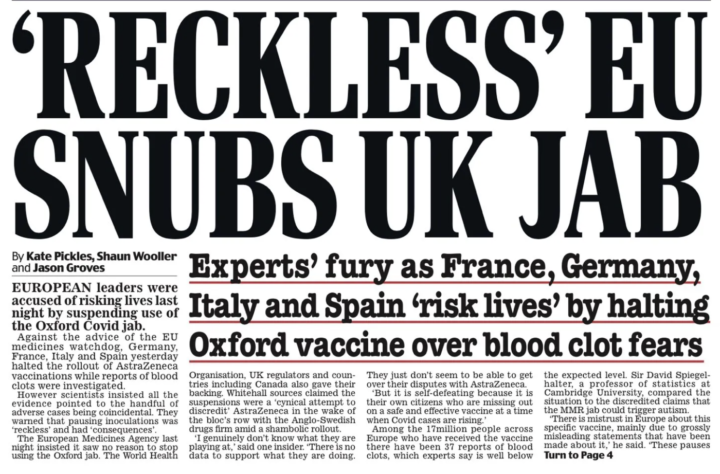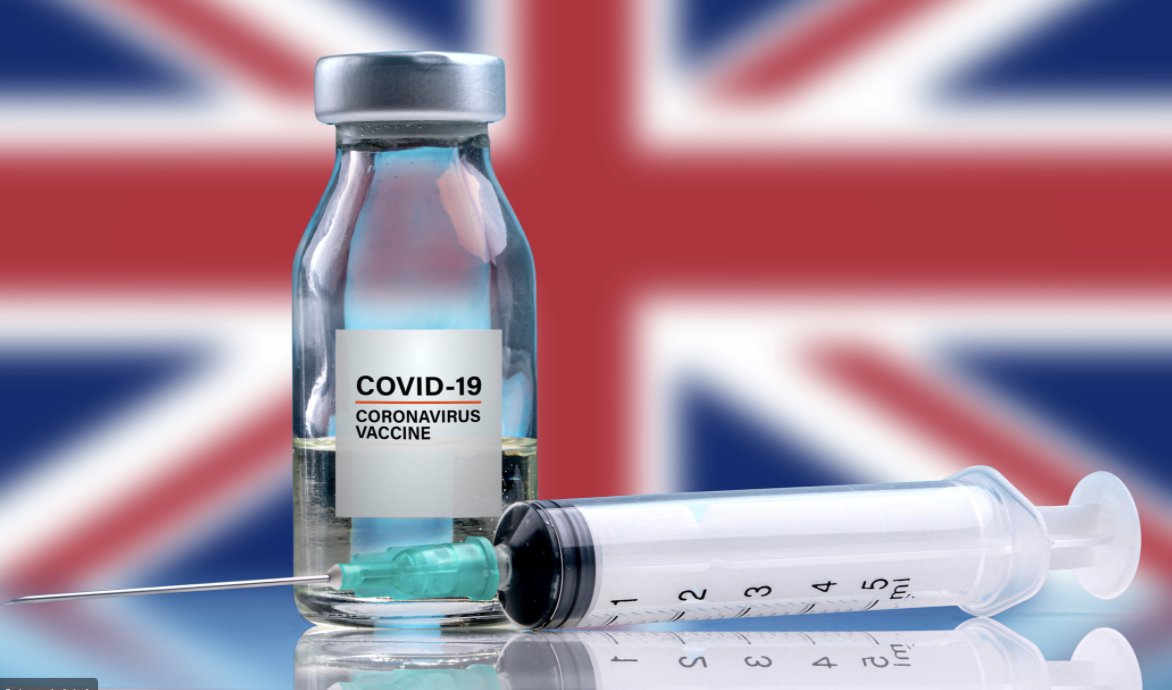Whenever I have advocated a different Covid vaccine policy, people tell me that there was a risk that my ideas would lead to a loss of confidence among the public. This never made sense to me. Wouldn’t the public have more confidence in authorities if they told the truth and did what is best?
More specifically, I advocated that the US adopt a “first-dose-first” policy, that we approve the Astra-Zeneca vaccine, and I opposed the halt in the Johnson & Johnson vaccine. This is also the approach taken by the UK. Despite this bold and honest approach, the UK seems to have far lower levels of vaccine hesitancy than other developed countries. Or is it because of this bold and honest approach?
You might wonder if the British people are different, less reluctant to take vaccines in general. Not so:
About 26 percent of Americans say they won’t take a vaccine, according to an April 21-26 CNN poll. Getting the pandemic under control in the US could be challenging without their buy-in.
Meanwhile, in the United Kingdom vaccine hesitancy sits much lower; government polling shows it’s around 6 percent. This is not necessarily because the British are inherently more enthusiastic about vaccination. Last summer, a poll found that 75 percent of Americans and 71 percent of British people were open to taking a vaccine if one existed and was recommended by their government.
The British public has good reason to trust their authorities on Covid vaccines, as they have mostly avoided game playing and instead dealt with vaccine issues in an honest and straightforward fashion:
One of the tactics that distinguishes the UK from the US, and much of the world, is its approach to regulation and public communication in response to bad news about the vaccines. It’s an approach that could well have helped develop greater public trust in the vaccines.
“In the UK, the medical communication has been pretty excellent,” David Comerford, an economist at the University of Stirling’s Behavioural Science Centre in the UK who researches vaccine hesitancy, told me. He focused particularly on how UK authorities reacted to and communicated about rare complications involving the vaccines that came out in news reports.
The vaccine has become so popular in the UK that even the right wing populist press is strongly in favor, as this article from the Daily Mirror Mail demonstrates:

PS. One wonders how things in America might have been different if the GOP had decided that the way to show loyalty to Trump was to encourage the use of the vaccine his administration championed, rather than to agree with his dubious theories of a stolen election.


READER COMMENTS
Thomas Lee Hutcheson
May 8 2021 at 6:52am
You do what the boss wants, not what YOU think would be good for the boss.
But the lack of transparency, the failure of the public health establishment to share their cost-benefit analyses for their decisions with the public, was and is not a Trump issue.
Michael Sandifer
May 8 2021 at 7:44am
In fairness, the right wing in the UK may support the vaccine effort, because a right wing government is in charge, but I agree with the broader point.
Unfortunately, non-right wingers are lying to people in the US, seemingly for the good of the people, though I agree that approach has likely backfired. Right wingers are lying to people for their own political and financial gain, as the right wing movement in the US has largely become a scam.
In both cases, there is the correct assumption that many Americans are very stupid, but I agree that the best approach is for the government to tell the truth so that as many stupid people as possible feel they are able to trust government experts.
MarkLouis
May 8 2021 at 8:17am
The very foundation of capitalism & democracy is that we trust individuals to consume vast amounts of information (much of it inaccurate or misleading …also known as “marketing”) and make their own decision. If we can’t trust individuals in aggregate, why let them select leaders or decide what to consume? We should tell the truth in nearly all situations.
Rajat
May 8 2021 at 8:57am
Have you listened to Tyler Cowen’s (latest) conversation with Daniel Carpenter from Harvard? In particular, about the US government’s decisions around AstraZeneca and the merits of that? Carpenter seems to believe that the FDA approving AZ wouldn’t have been of great benefit, putting the British public’s willingness to take it down to the fact AZ is a British company and the Brits’ faith in their NHS. It’s one of the few times when Tyler has really pushed back on one of his guests – a real ‘conversation’ in other words! Carpenter otherwise seemed fairly sober so I’d be interested in your thoughts.
Here’s the transcript – it’s about two-thirds the way through: https://medium.com/conversations-with-tyler/daniel-carpenter-tyler-cowen-vaccines-fda-government-6965f137ca6f
Scott Sumner
May 8 2021 at 11:27am
Thanks Rajat. That’s full of the sort of armchair social psychology that has proven wrong again and again. We can’t roll out vaccines in October to prevent the big winter wave of deaths because an election might create mistrust? Really?
Jon Murphy
May 8 2021 at 11:12am
I think you are 100% correct that the various US government agencies’ behaviors (whether it be Fauci lying about masks, or Fauci lying about the number of infections needed to achieve herd immunity, or the pauses over vaccines like you discuss here) does undermine public confidence both in the agencies and the treatments (including vaccines).
But I think that’s also just half the story. Even for those whose confidence is not shaken, who take the agencies’ actions to heart and understand their behavior, I think the behavior is damaging. The pauses over the vaccines and the insistence of lockdowns, mask mandates, etc., all give the impression the disease is far more dangerous, viral, and deadly than it actually is.
Thomas Lee Hutcheson
May 8 2021 at 7:12pm
The J&J pause gives the opposite message, that COVID causes so little harm that it’s worth allowing it to proceed more rapidly in order to show concern about blood clots.
Jon Murphy
May 9 2021 at 7:46pm
The pause gives the illusion that the vaccine is far more dangerous than the disease. It’s led to a strong anti-vax movement
Knut P. Heen
May 12 2021 at 10:46am
There are two sets of probabilities here. The probability of getting the vaccine is 100 percent once you decide to take it. The probability of getting Covid is not 100 percent. Given a Covid-infection, all the western vaccines seem safer for almost everyone. But suppose the probability of getting Covid is 1 percent? It is no longer obvious that the safe strategy is to take some of the vaccines. Norway put AstraZeneca on pause for exactly this reason. The probability of getting Covid was too low to recommend AstraZeneca.
Andrew_FL
May 8 2021 at 12:34pm
Why cite the policy choices of the Biden administration and then blame Republicans?
Mark Brady
May 8 2021 at 1:38pm
The Daily Mirror is not “right wing,” whatever that means. The Daily Mirror has supported the Labour Party since the 1945 general election, even in the most recent election in December 2019 when Jeremy Corbyn led Labour to defeat at the polls.
Britmouse
May 9 2021 at 1:48am
This is a Daily Mail article not a Daily Mirror article. The bombastic headline is surely a giveaway.
Scott Sumner
May 9 2021 at 12:44pm
Thanks, I fixed it.
Todd Kreider
May 8 2021 at 4:52pm
What matters the most is the percent of those over 60 who are vaccinated, and much less the percent of those 16 and older who get vaccinated. By September, 88% of the American adult population is expected to be vaccinated (IHME, which has been consistently wrong with their predictions) and if that holds then almost no vaccine resistance despite a few thousand vaccine deaths and some very bad 1 to 3 day side effects. Also, while now an almost taboo topic, natural immunity will continue to reduce serious cases into the summer and fall.
Jens
May 9 2021 at 3:50am
I think it makes a difference whether you decide that you do not want to be vaccinated at all or whether you decide that you will not be vaccinated with vector vaccine right now, but will quote soon be vaccinated with mRNA. Just as it makes a difference whether you might get COVID-19 at some point in the future (or not at all) or were vaccinated yesterday (and have headache today). And I don’t think that’s just psychology.
TMC
May 9 2021 at 10:38am
Good post til the TDS bit. It was the GOP’s fault Harris and Pelosi said they didn’t trust the ‘Trump’ vaccine? And a post not mentioning Fauci’s involvement in the mistrust is missing a huge point.
Scott Sumner
May 11 2021 at 4:03pm
Pelosi explains why it’s GOP voters that don’t want to be vaccinated?
JayT
May 12 2021 at 2:37pm
It might not be the prevailing story, but in actual practice it’s African Americans and Hispanics that are least likely to be vaccinated. Those are populations that I could imagine being swayed by those kinds of comments.
Comments are closed.